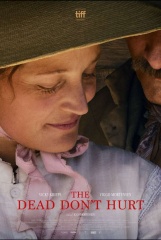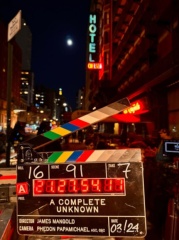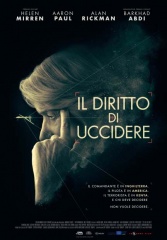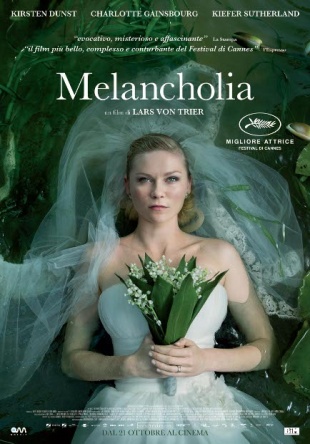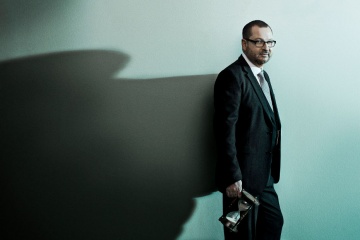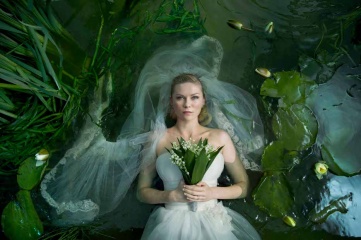|
|
MELANCHOLIA: UNA COSMICA 'DANZA DI MORTE' TRA DUE PIANETI - TERRA E MELANCHOLIA - NELL'APOCALITTICA 'VISIONE' DELLA FINE DEL MONDO PROSPETTATA DA LARS VON TRIER. DUE EROINE TRAGICHE - KIRSTEN DUNT (JUSTINE) E CHARLOTTE GAINSBOURG (CLAIRE) PER UN INELUTTABILE DESTINO DEL GENERE UMANO
RECENSIONE ITALIANA e PREVIEW IN ENGLISH - Dal 64. Festival del Cinema di CANNES - PALMA D'ORO alla 'Migliore Attrice' (KIRSTEN DUNST) - Dal 21 OTTOBRE
"E' sdolcinato, è un film da donna! Mi verrebbe voglia di 'rigettarlo' come un organo trapiantato. Ma cos'è che volevo? Una cosa è certa: partendo da uno stato d'animo, volevo buttarmi a capofitto negli abissi del romanticismo tedesco. Wagner a mille. O forse era un modo per parlare della sconfitta. Sconfitta al minimo dei comuni denominatori cinematografici. Il tema romantico è sempre stato trattato in modo banale e ottuso, nel film tradizionale. Ho amato molto il cinema romantico, devo ammetterlo. Farò un solo nome su tutti: Visconti! Il romanticismo tedesco ti lascia senza fiato, certo. Ma nel cinema di Visconti c'è sempre qualcosa che trascende il banale, che lo eleva a capolavoro! Ora mi sento confuso e in colpa. Che ho fatto? E' la fine di Trier? Mi aggrappo alla speranza che in tanta melassa possa esserci una scheggia d'osso che rompe qualche dente.… Chiudo gli occhi e spero!".
Il regista Lars Von Trier
(Melancholia; DANIMARCA/FRANCIA/SVEZIA/GERMANIA/ITALIA 2011; Thriller drammatico Sci-Fi; 130'; Produz.: Memfis Film/Slot Machine/Trollhättan Film AB/Zentropa Entertainments/Zentropa International Köln/BIM Distribuzione/Eurimages in co-produz. con arte France Cinéma; Distribuz.: BIM)
Sinossi:
IN BREVE:
Justine e Michael stanno per sposarsi, il ricevimento si terrà nella casa della sorella di Justine, ma proprio in quei giorni un evento catastrofico minaccia la terra ed i suoi abitanti…
SHORT SYNOPSIS:
Two sisters find their relationship challenged as a nearby planet threatens to collide into the Earth.
Commento critico (a cura di PATRIZIA FERRETTI)
|
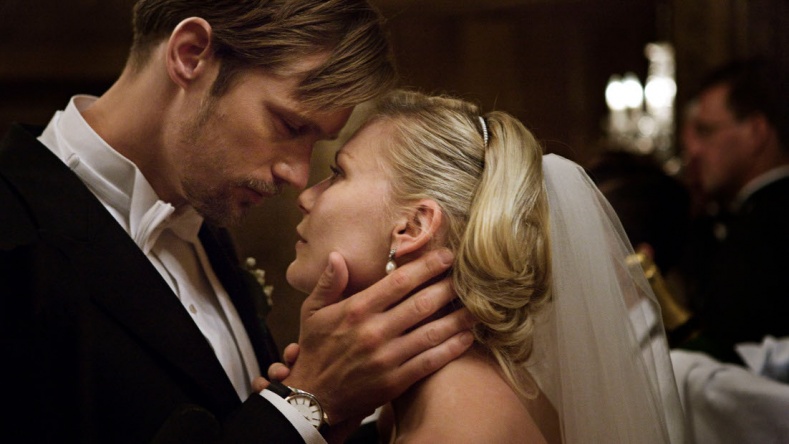 'MELANCHOLIA': L'APOCALISSE 'ROMANTICO-CLASSICHEGGIANTE' DI LARS VON TRIER
'MELANCHOLIA': L'APOCALISSE 'ROMANTICO-CLASSICHEGGIANTE' DI LARS VON TRIER
Lasciamo perdere certi suoi 'deragliamenti' mentali prima che verbali: quel che ha detto a Cannes √® meglio dimenticarlo! Vai a sapere che cosa gorgoglia alle volte in queste anime d'artista 'scapigliate' l√† dove la follia va a braccetto con la genialit√†. Veniamo direttamente al film Melancholia, titolo 'mascotte' di anima intristita per eccellenza, e dunque pi√Ļ che ben disposta ad una visione 'apocalittico-nichilista' dell'universo: a dichiararsi fermamente convinta della totale assenza del genere umano nell'universo, circoscritto unicamente al pianeta Terra "e non ancora per molto", di l√¨ a poco destinata a dileguarsi nel nulla, √® Justine (la splendida e candidamente magnetica Kirsten Dunst in tutta la sua variegata introspezione espressa anche con l'integrale nudo notturno al 'melancholico' chiaror da manuale d'arte), quella che 'sa le cose', secondo un profilo affine ad una 'neo icona Cassandrina', l'altra faccia di un'unica, tragica medaglia, condivisa con |
|
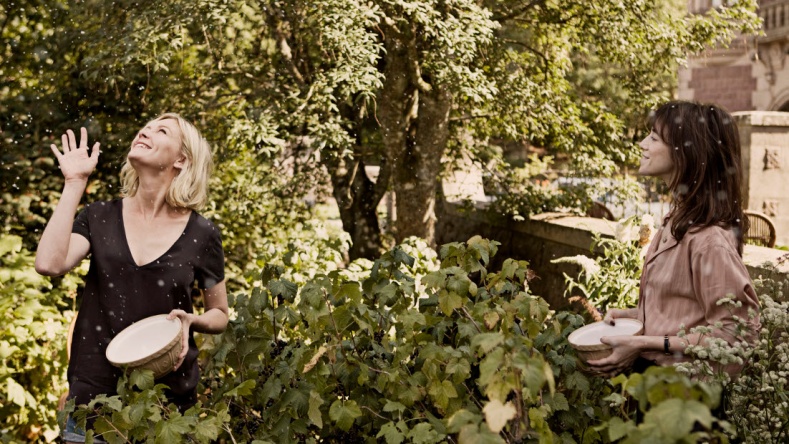 la sorella Claire (Charlotte Gainsbourg). Beh, una visione che non stupisce quando espressa dalla tetra visionariet√† di Lars Von Trier (Antichrist). Ma Melancholia rischia di distinguersi non tanto per originalit√† quanto per una linearit√† 'classicheggiante' che non siamo abituati ad associare al nome di Lars Von Trier. Anzi, a dirla tutta, proprio sul binario di questa interconnessione tra microcellule individual-familiari e moti cosmici, The Tree of Life di Terrence Malick ha indubbiamente apportato un messaggio pi√Ļ pienamente significante sia dal punto di vista contenutistico che artistico. L'estetica Malickiana nel film-meditazione The Tree of Life si merita lo scettro del capolavoro mentre Melancholia pu√≤ indubbiamente profilarsi come interessantissimo 'corollario' ma il raggio d'azione su cui si spazia, e l'orizzonte cui si mira, denunciano apertamente i limiti di un campo pi√Ļ circoscritto. Anche se forse lo √® per scelta pi√Ļ che per difetto. Lars Von Trier non punta alla sorpresa ma all'analisi:
la sorella Claire (Charlotte Gainsbourg). Beh, una visione che non stupisce quando espressa dalla tetra visionariet√† di Lars Von Trier (Antichrist). Ma Melancholia rischia di distinguersi non tanto per originalit√† quanto per una linearit√† 'classicheggiante' che non siamo abituati ad associare al nome di Lars Von Trier. Anzi, a dirla tutta, proprio sul binario di questa interconnessione tra microcellule individual-familiari e moti cosmici, The Tree of Life di Terrence Malick ha indubbiamente apportato un messaggio pi√Ļ pienamente significante sia dal punto di vista contenutistico che artistico. L'estetica Malickiana nel film-meditazione The Tree of Life si merita lo scettro del capolavoro mentre Melancholia pu√≤ indubbiamente profilarsi come interessantissimo 'corollario' ma il raggio d'azione su cui si spazia, e l'orizzonte cui si mira, denunciano apertamente i limiti di un campo pi√Ļ circoscritto. Anche se forse lo √® per scelta pi√Ļ che per difetto. Lars Von Trier non punta alla sorpresa ma all'analisi: |
|
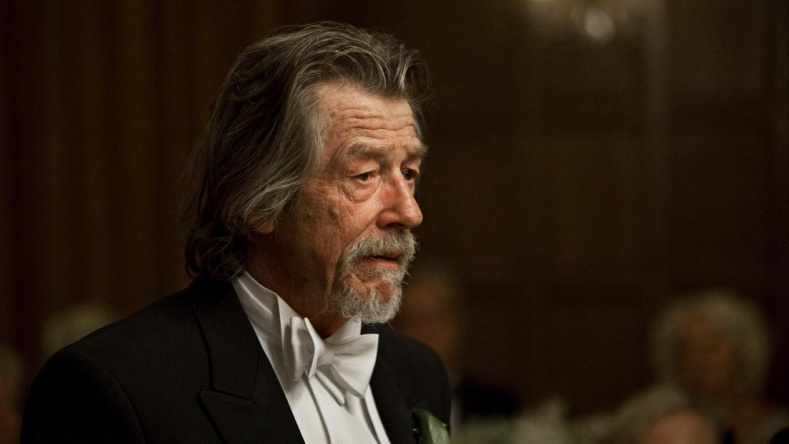 e mentre psicoananalizza l'indole e l'interazione umana delle due protagoniste incastonate nei rispettivi microcosmi intercomunicanti, dimostra l'ineluttabilit√† del risultato, gi√† anticipato all'inizio, della sua 'equazione'. Il finale del film dunque, potrebbe persino risultare banale e, se vogliamo, orecchiato da precedenti ben pi√Ļ commerciali, anche se di grande appeal, come ad esempio Deep Impact (la sequenza sulla spiaggia del travolgimento 'apocalittico' che annulla, azzera) ma Lars riesce a trovare ugualmente il modo di convertirlo, di tradurlo in un qualcosa di unico e spiazzante.
e mentre psicoananalizza l'indole e l'interazione umana delle due protagoniste incastonate nei rispettivi microcosmi intercomunicanti, dimostra l'ineluttabilit√† del risultato, gi√† anticipato all'inizio, della sua 'equazione'. Il finale del film dunque, potrebbe persino risultare banale e, se vogliamo, orecchiato da precedenti ben pi√Ļ commerciali, anche se di grande appeal, come ad esempio Deep Impact (la sequenza sulla spiaggia del travolgimento 'apocalittico' che annulla, azzera) ma Lars riesce a trovare ugualmente il modo di convertirlo, di tradurlo in un qualcosa di unico e spiazzante.
D'altra parte, come già in Antichrist, anche qui in Melancholia, quel che di Lars Von Trier non si può proprio perdere è quella sorta di prologo che introietta il corpo centrale della storia. Si direbbe un motivo firma inconfondibile e irrinunciabile per lui - e per nostra fortuna! - di una bellezza tragica sconvolgente. La premessa con cui Lars getta tutti i semi del suo futuro germoglio. Semi di |
|
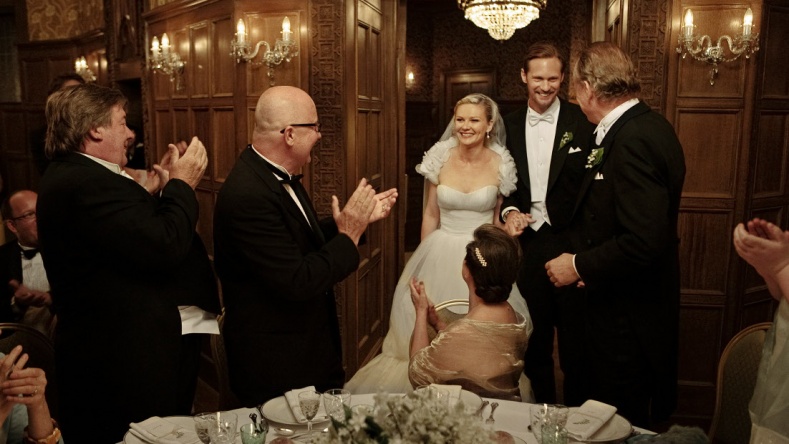 una fertilità da 'vacche grasse', che non conosce carestia, semi di una conoscenza illuminante per 'illuminati' in meditazione. Semi che abbisognano di almeno tre stagioni per il tempo di semina quando magari ne è sufficiente solo una per il raccolto. In questa sorta di prologo Lars Von Trier adora infatti, affidarsi al 'ralenti estremo', del tipo che flirta con il fermo immagine, quasi un piano sequenza sul fotogramma. E' fantastico! Di una bellezza sovrumana e di un carico significante travolgente, spiazzante, da togliere il respiro! E' arte allo stato puro e non solo per i numerosi richiami a noti quadri, protagonisti della storia dell'arte europea, di cui Lars tiene a rimarcare i connotati nel corso del film.
una fertilità da 'vacche grasse', che non conosce carestia, semi di una conoscenza illuminante per 'illuminati' in meditazione. Semi che abbisognano di almeno tre stagioni per il tempo di semina quando magari ne è sufficiente solo una per il raccolto. In questa sorta di prologo Lars Von Trier adora infatti, affidarsi al 'ralenti estremo', del tipo che flirta con il fermo immagine, quasi un piano sequenza sul fotogramma. E' fantastico! Di una bellezza sovrumana e di un carico significante travolgente, spiazzante, da togliere il respiro! E' arte allo stato puro e non solo per i numerosi richiami a noti quadri, protagonisti della storia dell'arte europea, di cui Lars tiene a rimarcare i connotati nel corso del film.
Per restare un momento su questo registro, come ho già anticipato nella rubrica 'Anteprima' di 'CelluloidPortraits', se Melancholia potesse essere un dipinto potrebbe essere L'isola dei morti, opera di cui dal 1880 al |
|
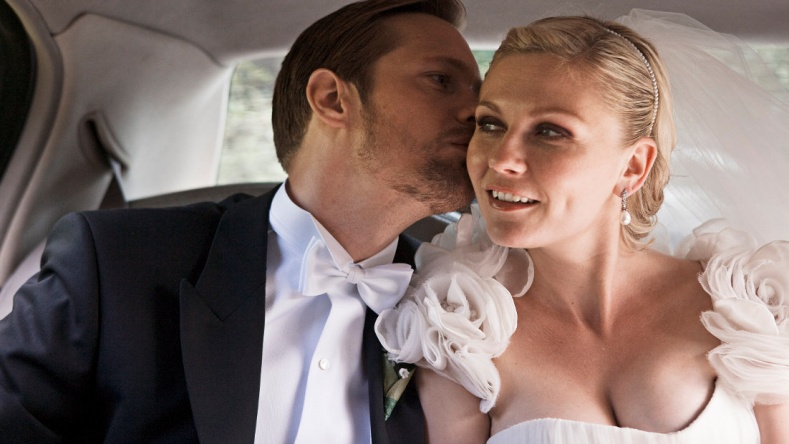 1886 il celebre pittore simbolista svizzero Arnold Böecklin (1827-1901) elaborò diverse versioni in grado di affascinare molti intellettuali dell'epoca, tra cui peraltro il padre della psicanalisi Sigmund Freud. E proprio l'identikit de L'isola dei morti fornita dal suo stesso autore - "un'immagine onirica: essa deve produrre un tale silenzio che il bussare alla porta dovrebbe fare paura" - sembra condividere con il film di Lars Von Trier Melancholia, lo stesso fine, lo stesso approdo.
1886 il celebre pittore simbolista svizzero Arnold Böecklin (1827-1901) elaborò diverse versioni in grado di affascinare molti intellettuali dell'epoca, tra cui peraltro il padre della psicanalisi Sigmund Freud. E proprio l'identikit de L'isola dei morti fornita dal suo stesso autore - "un'immagine onirica: essa deve produrre un tale silenzio che il bussare alla porta dovrebbe fare paura" - sembra condividere con il film di Lars Von Trier Melancholia, lo stesso fine, lo stesso approdo.
E' evidente che Lars Von Trier aveva in mente una cornice ben precisa, a quanto pare, di matrice 'classicheggiante'. E' lui stesso a parlarci di Visconti, del romanticismo tedesco, di Wagner. Ne tradiscono l'accordo preferenziale anche per l'appunto le scelte musicali, talora pronte a cavalcare note trionfalistiche da melò vintage, elette ad incastonare alcuni snodi climax resi protagonisti con lo svilupparsi della storia. Ma è ancora una volta con il prologo, nelle melanconiche nuances della fotografia, |
|
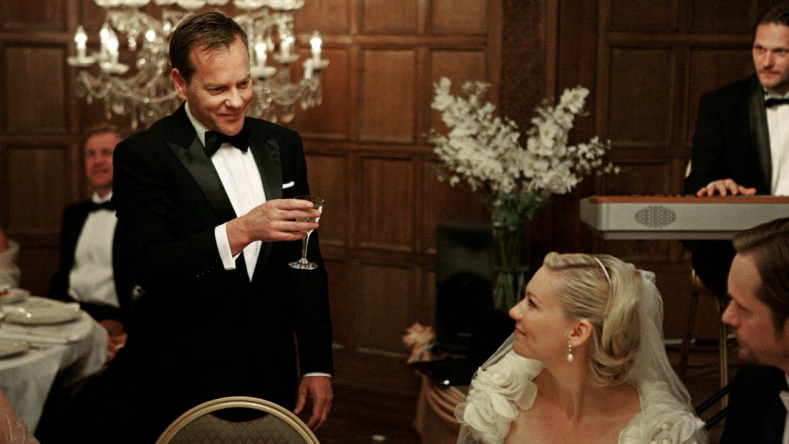 che Lars von Trier svela, già in prima battuta, l'anima 'nera' dell'affascinante, luminescente, energia azzurrina di Melancholia: un'apocalisse dei nostri tempi dove non è contemplato alcun ricorso in appello, dove per quella intrigante "danza di morte" intrapresa tra due nuovi partners - i pianeti Terra e Melancholia - non poteva che esserci, un unico, tragico epilogo, là dove il 'Giudizio' è oltremodo 'Universale' e 'assolutamente' insindacabile, quanto il silente telo del grande schermo!
che Lars von Trier svela, già in prima battuta, l'anima 'nera' dell'affascinante, luminescente, energia azzurrina di Melancholia: un'apocalisse dei nostri tempi dove non è contemplato alcun ricorso in appello, dove per quella intrigante "danza di morte" intrapresa tra due nuovi partners - i pianeti Terra e Melancholia - non poteva che esserci, un unico, tragico epilogo, là dove il 'Giudizio' è oltremodo 'Universale' e 'assolutamente' insindacabile, quanto il silente telo del grande schermo! |
|
|
|
|
|
|
|
|
|
|
|
|
|
|
|
|
|
|
Secondo commento critico (a cura di PETER DEBRUGE, www.variety.com)
|
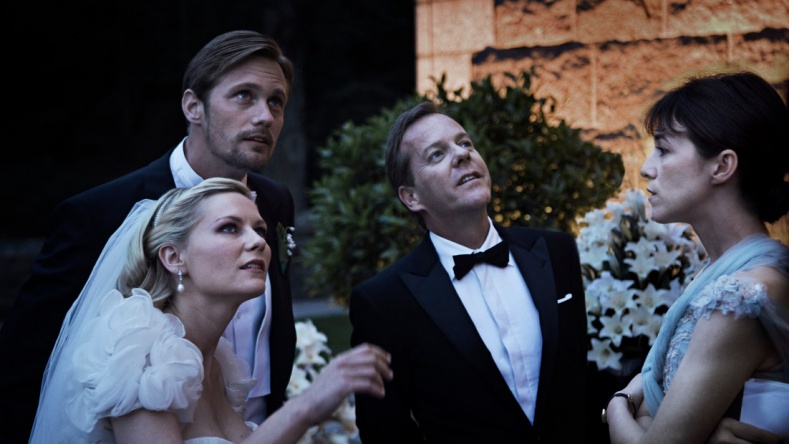 It's the end of the world but also the start of something new for Lars von Trier, whose mind-blowing "Melancholia" offers perhaps the gentlest depiction of annihilation one could imagine from any director, much less the Danish provocateur. If "Antichrist" was the needle in the eye von Trier needed to shake a bout of pulverizing depression, then "Melancholia" serves as his unexpectedly lucid response, blending grand-scale Hollywood effects with intimate, femme-focused melodrama. Think "The Celebration" meets "Armageddon," a marketable combination that brings spectacle to the arthouse, sure to inspire discussion and debate in ways no studio-made disaster movie possibly could.
It's the end of the world but also the start of something new for Lars von Trier, whose mind-blowing "Melancholia" offers perhaps the gentlest depiction of annihilation one could imagine from any director, much less the Danish provocateur. If "Antichrist" was the needle in the eye von Trier needed to shake a bout of pulverizing depression, then "Melancholia" serves as his unexpectedly lucid response, blending grand-scale Hollywood effects with intimate, femme-focused melodrama. Think "The Celebration" meets "Armageddon," a marketable combination that brings spectacle to the arthouse, sure to inspire discussion and debate in ways no studio-made disaster movie possibly could.
Whereas the last 15 years of von Trier's career have been characterized by a state of extreme agitation, going back at least as far as "Breaking the Waves," this latest endeavor preaches Zen-like acceptance in the face of mankind's potential extinction. This remarkable calm is perhaps the most shocking thing |
|
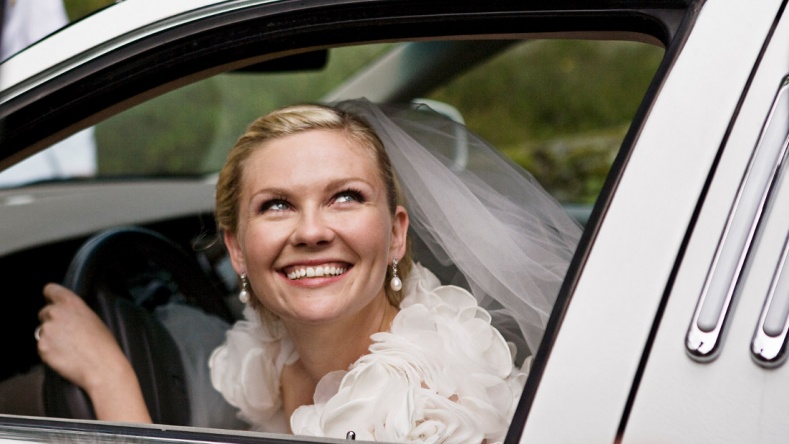 about a film in which much of the action centers on the dynamic between two sisters, Justine (Kirsten Dunst) and Claire (Charlotte Gainsbourg, whose French accent is never explained), as a passing planet threatens to obliterate the earth.
about a film in which much of the action centers on the dynamic between two sisters, Justine (Kirsten Dunst) and Claire (Charlotte Gainsbourg, whose French accent is never explained), as a passing planet threatens to obliterate the earth.
"Melancholia" opens with an eight-minute overture set to Wagner's "Tristan and Isolde," featuring a series of surreal tableaux -- stunning, digitally retouched shots that echo the dreamlike compositions of American photographer Gregory Crewdson: Justine looking impassive amid a shower of dead birds, trudging through a dark forest in her wedding dress, floating Ophelia-like in a murky pond and reaching out as flames of electricity dance across her fingertips. Intercut with these indelible supernatural images are stellar visions in which the visiting planet (which von Trier has cheekily christened Melancholia) approaches and ultimately collides with earth in a wall-rattling, seat-shaking thunder.
While disorienting, the sequence certainly gets us thinking in grand, cosmic terms. |
|
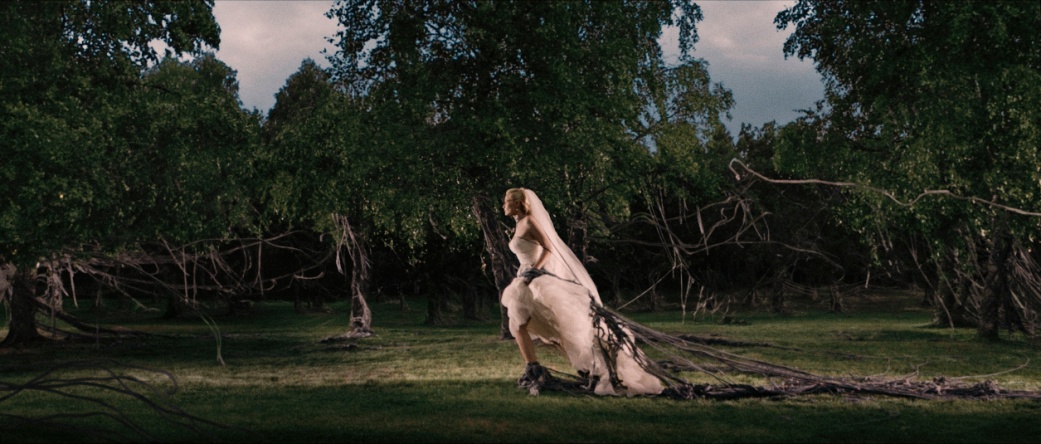 Cut to Justine and her newlywed husband, Michael (Alexander Skarsgard), trying to reach their own wedding party, as the chauffeur struggles to navigate their stretch limo up the winding driveway of her brother-in-law's palatial mansion. The shooting style, so carefully controlled throughout the opening montage, immediately reverts to the more disorienting handheld approach von Trier employed in his Dogma 95 days, bringing a raw immediacy to the festivities.
Cut to Justine and her newlywed husband, Michael (Alexander Skarsgard), trying to reach their own wedding party, as the chauffeur struggles to navigate their stretch limo up the winding driveway of her brother-in-law's palatial mansion. The shooting style, so carefully controlled throughout the opening montage, immediately reverts to the more disorienting handheld approach von Trier employed in his Dogma 95 days, bringing a raw immediacy to the festivities.
After the couple arrives at the party, von Trier slowly reveals subtle tensions between the other family members, especially John Hurt and a wonderfully cantankerous Charlotte Rampling as the sisters' divorced parents. But these dynamics are little more than a diversion, temporarily distracting us from the fact that Justine is not at all the level-headed young lady she appears to be. As the evening wears on, Justine's behavior becomes increasingly abnormal, threatening to ruin the entire wedding. She's prone to anxieties, doubts |
|
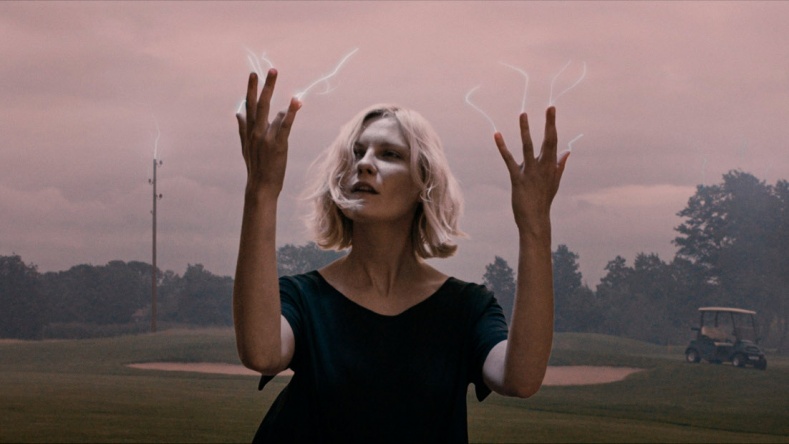 and good, old-fashioned hysteria.
and good, old-fashioned hysteria.
But unlike the damaged women von Trier has offered up in the past, Justine actually appears to be the character with whom the director most closely identifies. Her wedding could just as well be a film festival or any other stage in which the public expects von Trier to play the good puppet. (His post-"Melancholia" press conference at Cannes, where he told journos he understood Hitler, found the director back in his usual frisky humor.) Justine's character works in advertising -- that crassest of professions, presented here as an analogy for sell-out commercial filmmaking -- and her boss (Stellan Skarsgard) hovers constantly at the wedding, pressuring her to deliver a tagline like a wheedling producer demanding to know what the director's next project might be.
Justine has visions. "I know things," she tells Claire in the film's second half, which takes place a few weeks later, |
|
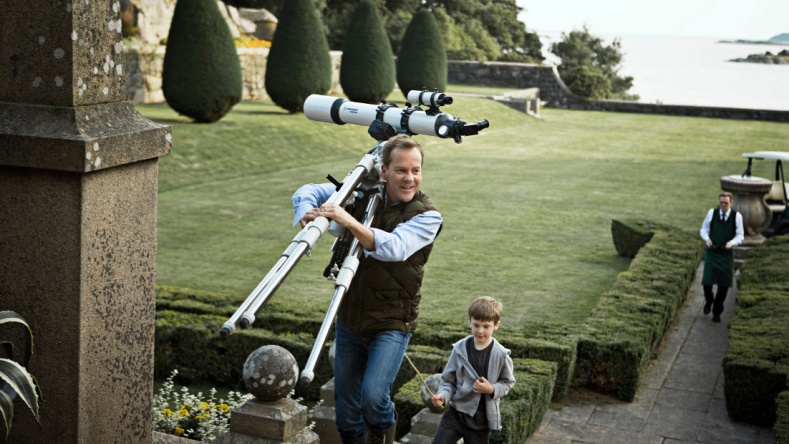 mere days before the two planets collide. Von Trier also knows things. Such is the Cassandra-like curse of the artist, who risks ridicule for daring to show the public what it doesn't wish to see -- in this case, a willingness to confront death and the very futility of our existence.
mere days before the two planets collide. Von Trier also knows things. Such is the Cassandra-like curse of the artist, who risks ridicule for daring to show the public what it doesn't wish to see -- in this case, a willingness to confront death and the very futility of our existence.
Yes, doomsday looms as a planet hurtles toward Earth, but as in all great science fiction, this fantastical premise allows the artist to play sociologist. "Melancholia" takes a page from M. Night Shyamalan, using a blockbuster genre to study how a tight-knit family unit responds under an extreme set of conditions. Here, it is the seemingly unbalanced Justine who emerges as the film's strongest character, eclipsing her know-it-all brother-in-law, Jack (Kiefer Sutherland, whose smug expertise von Trier happily puts in its place, much as he checked Willem Dafoe's character in "Antichrist," only far less graphically).
For all the tyrannical |
|
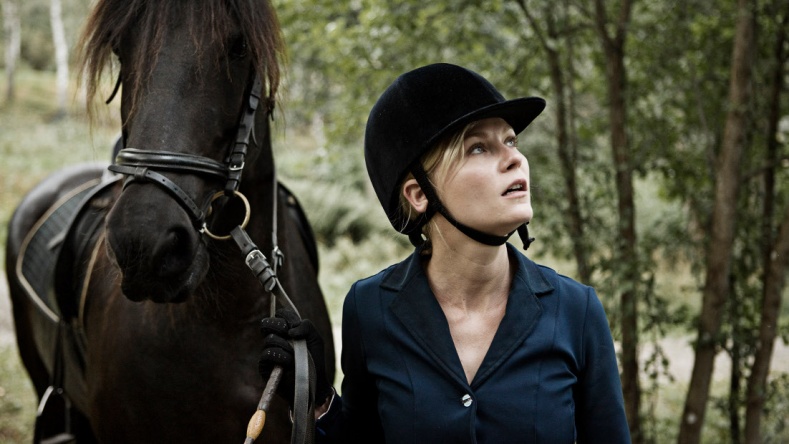 disdain he's shown other filmmakers over the years, von Trier once again demonstrates a mastery of classical technique, extracting incredibly strong performances from his cast while serving up a sturdy blend of fly-on-the-wall naturalism and jaw-dropping visual effects. Given the film's high-concept premise, things could have been a lot different in the hands of another director, but with von Trier, it's just as Justine tells her exasperated spouse at the end of their chapter together: "What did you expect?".
disdain he's shown other filmmakers over the years, von Trier once again demonstrates a mastery of classical technique, extracting incredibly strong performances from his cast while serving up a sturdy blend of fly-on-the-wall naturalism and jaw-dropping visual effects. Given the film's high-concept premise, things could have been a lot different in the hands of another director, but with von Trier, it's just as Justine tells her exasperated spouse at the end of their chapter together: "What did you expect?". |
Perle di sceneggiatura
Pressbook:
 PRESSBOOK ITALIANO di MELANCHOLIA
PRESSBOOK ITALIANO di MELANCHOLIA
Links:
• MELANCHOLIA - INTERVISTA al regista LARS VON TRIER (A cura di NILS THORSEN) - (I. PARTE) (Interviste)
• MELANCHOLIA - INTERVISTA al regista LARS VON TRIER (A cura di NILS THORSEN) - (II. PARTE) (Interviste)
• MELANCHOLIA - INTERVISTA al regista LARS VON TRIER (A cura di NILS THORSEN) - (III. PARTE) (Interviste)
• DAL FESTIVAL DEL CINEMA DI CANNES ALLA SALA CINEMATOGRAFICA: 'MELANCHOLIA' DI LARS VON TRIER, DAL 21 OTTOBRE (Anteprime)
Galleria Fotografica:
Galleria Video:
 Melancholia - trailer
Melancholia - trailer
 Melancholia - trailer (versione originale)
Melancholia - trailer (versione originale)
 Melancholia - clip 'Le lanterne'
Melancholia - clip 'Le lanterne'
 Melancholia - clip 'Il giardino'
Melancholia - clip 'Il giardino'
 Melancholia - clip 'Il matrimonio'
Melancholia - clip 'Il matrimonio'
 Melancholia - clip 'Non serve a niente andare in paese'
Melancholia - clip 'Non serve a niente andare in paese'
 Melancholia - clip (versione originale)
Melancholia - clip (versione originale)
<- torna alla pagina Movies & DVD
|
|
|


